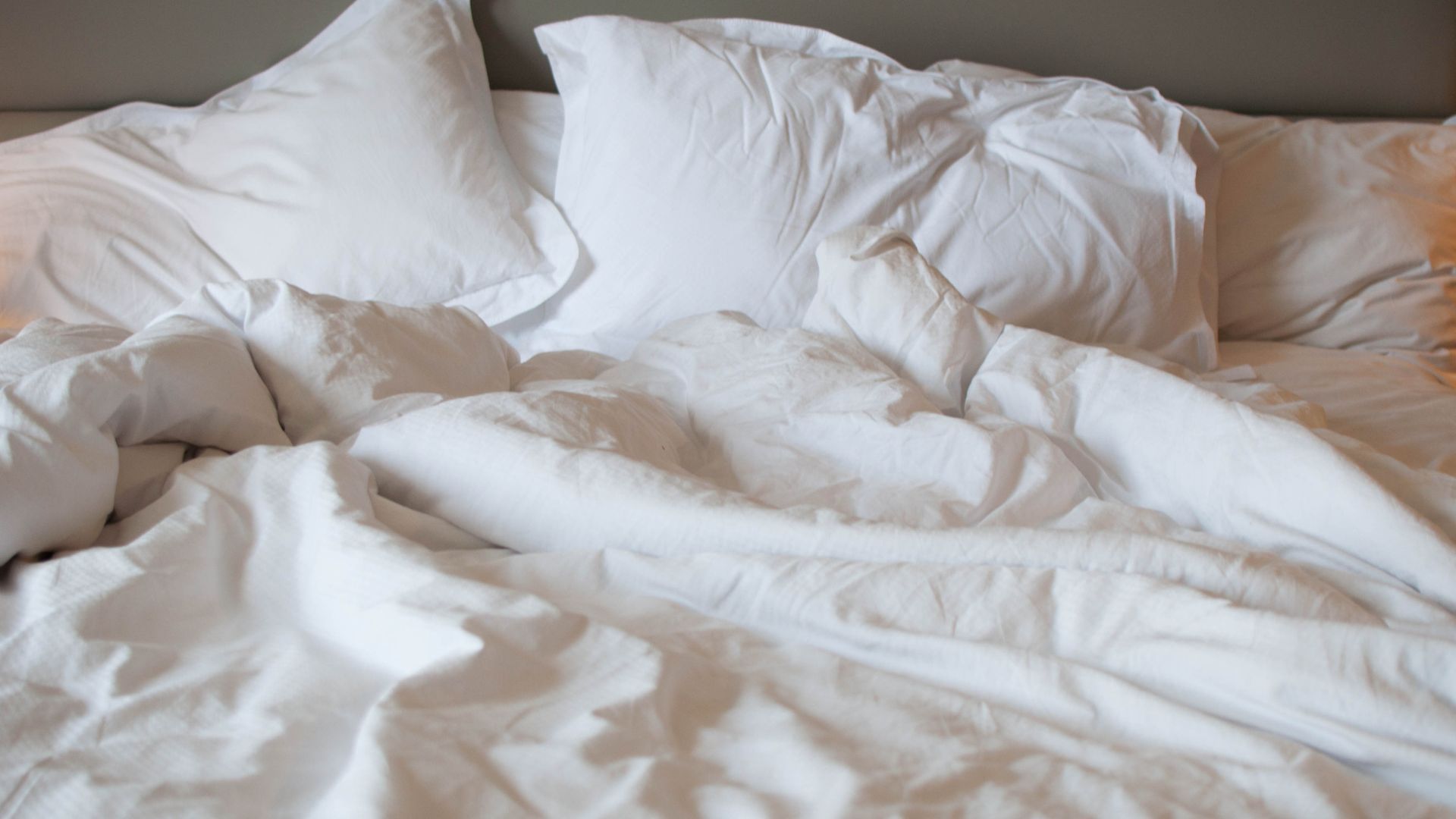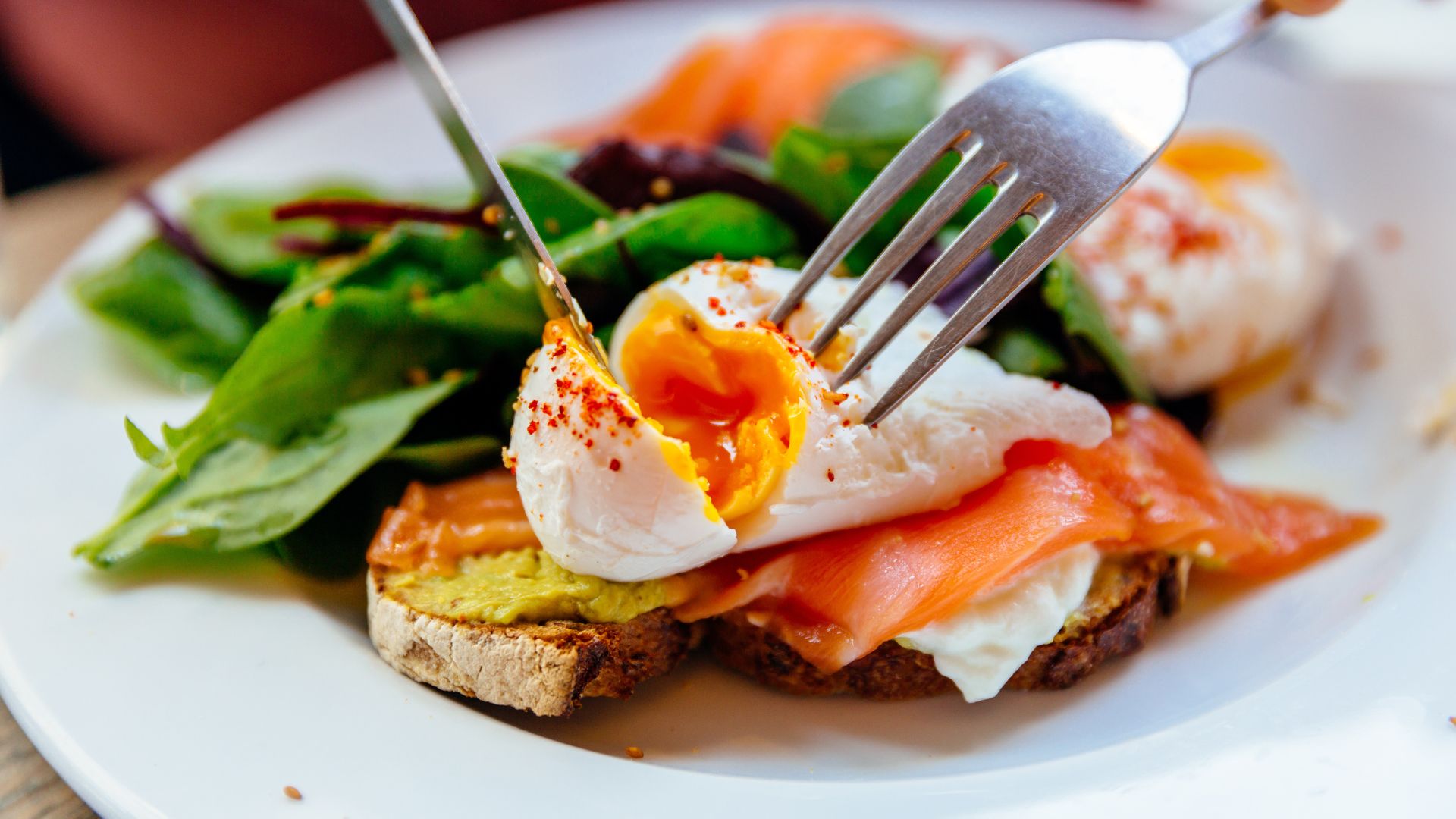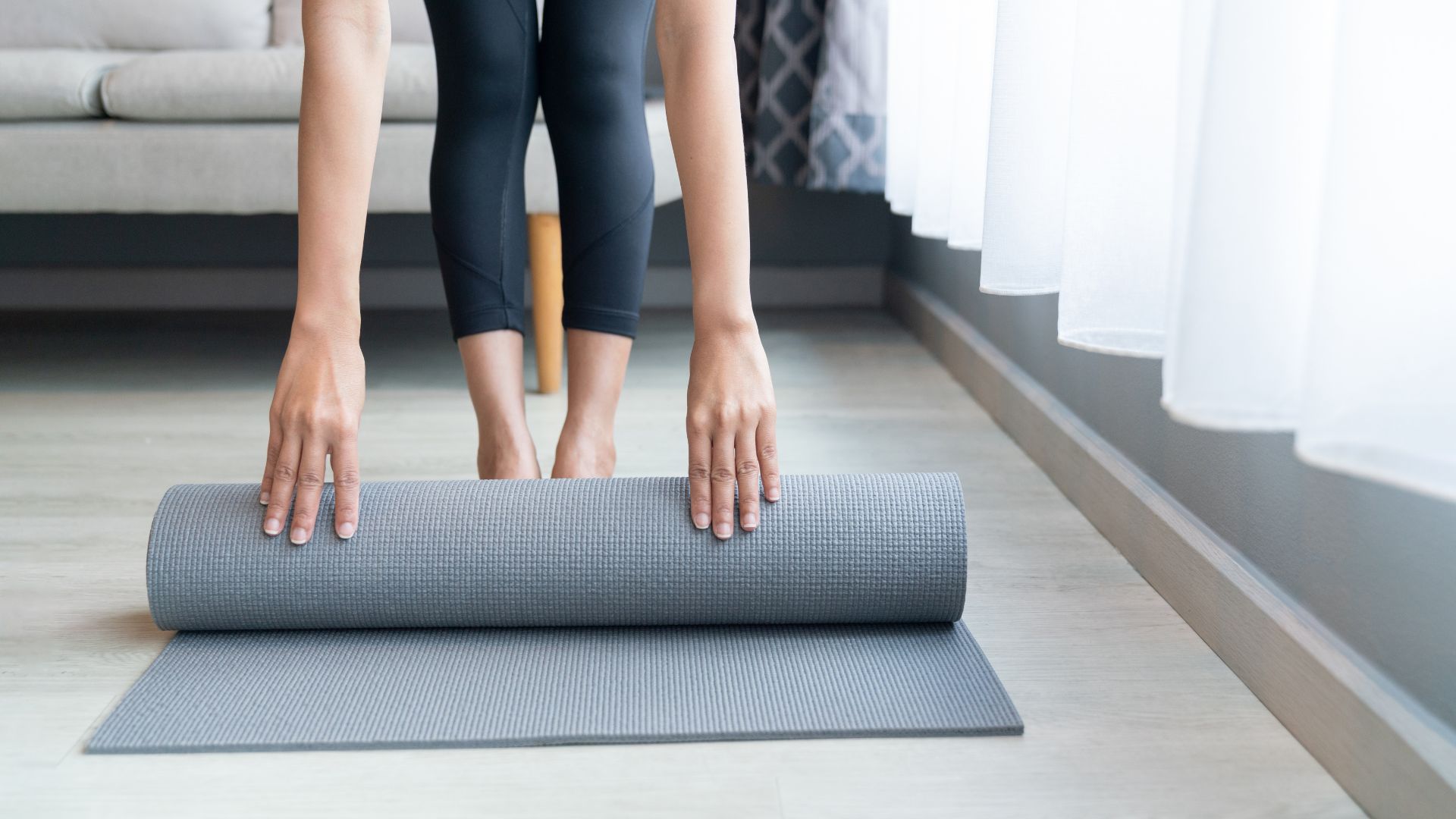Can you burn fat while you sleep? Experts reveal the truth
Can you burn fat while you sleep? Experts sort fact from fiction around fat loss


If you've ever weighed yourself in the morning, and to your surprise noticed a change in the scales, you might be wondering can you burn fat while you sleep? Our experts are here to sort fact from fiction and answer your fat-burning questions.
With a rise in weight loss supplements and bedtime drinks to lose weight, it's no surprise many of us are confused about whether we can really burn fat in our sleep, without making any changes to our lifestyles.
In reality, this is far from the truth - diet and physical activity go hand in hand, and you must be in a calorie deficit to lose weight in a safe and sustainable way. This means you must consume fewer calories than you are burning every day. If you're dieting but not losing weight or exercising and not seeing any results, it could be because you're still consuming more calories than you are burning each day. To help you on your weight loss journey, we asked a sleep doctor, nutritionist and personal trainer what really happens to your body weight as your sleep. Plus, they share their top weight loss tips.
Can you burn fat while you sleep?
The popularity of bedtime drinks to help you lose weight suggest many people are trying to boost weight loss through the night. These products are often used by those who want quick weight loss results or want to lose weight without dieting or without exercise. But, in reality, if you notice a change in your weight in the morning compared to the night before, this isn't down to fat loss.
"The loss of water through respiration during sleep can contribute to weight fluctuations between the morning and evening," explains Dr Chester Wu, psychiatrist and sleep specialist who also works as a medical reviewer at Rise Science. "Another reason is the emptying of the bladder and the bowels that usually occurs in the morning. Plus, not eating or drinking during the night, can contribute to a temporary decrease in body weight in the morning."
As for the nighttime weight loss drinks, Dr Wu says there is no evidence to suggest they can support weight loss. "Some bedtime drinks that claim to help with weight loss contain ingredients such as ginger, lemon, apple cider vinegar, or honey. However, the evidence supporting the effectiveness of these ingredients for weight loss is limited," he explains. "And, some of these drinks may even be harmful to health if consumed excessively or in combination with certain medications."
If you're taking any medication you should always consult with your doctor before using new supplements or herbal health remedies.
Sign up to our free daily email for the latest royal and entertainment news, interesting opinion, expert advice on styling and beauty trends, and no-nonsense guides to the health and wellness questions you want answered.
What helps to burn fat while you sleep?
"You cannot specifically target fat loss," Brookell White, registered dietitian and Nutrition Consultant at MyFitnessPal tells us. "However, accumulating excess weight, especially visceral fat (abdominal) is detrimental to your health because visceral fat is related to increased health risks." This is why sustainable weight loss is key, and it all comes down to a consistent calorie deficit, which involves assessing your diet and activity levels.
"Achieving a healthy weight long term is about about making small changes to your habits, slowly," adds nutritional therapist Jane Mostowfi. "This could include removing sugary foods from your diet or adding 30 minutes of movement into our daily routine. Once you have established that new habit, start to develop another one."
To help you with your weight loss journey, our experts share their top tips for reducing body fat. For more, see our guides on how to lose weight in a week and how to lose a stone in a month, all of which involve making realistic and consistent changes to your lifestyle for long-lasting results.
1. Eat a protein rich breakfast
Not only is a protein-rich breakfast delicious, but it could also help with fat loss. It will kickstart your metabolism, keep you fuller for longer, and make you less likely to crave sugary foods throughout the day.
"It helps to regulate your blood sugar levels so that you don't crave high-sugar foods later in the day," Mostowfi explains.
Swap your sugary morning cereal for eggs on wholemeal toast, tofu scramble or pancakes made using the best protein powder. We've also rated the best protein shakes for losing weight if you don't like eating larger meals early in the morning.

2. Add cardio and strength training to your exercise regime
Cardio activity not only helps to maintain a healthy weight long-term, but it will also improve your overall wellbeing by promoting heart and lung health.
"Cardio workouts will help raise your heart rate and burn calories, which is great if fat loss is your goal," Kate Rowe-Ham menopause fitness coach and the founder of the Owning Your Menopause app explains. However, she notes that strength training is equally important for women over the age of 35, too.
"I also encourage women over 35 to add more weight sessions into their regimes to build strength and support weight loss, as fat burn becomes harder towards midlife," she adds.
White agrees: "The best way to improve your body composition (increasing your muscle mass and decreasing your fat mass) is to regularly do resistance training." She adds that this can help to increase your lean body mass, and in turn increase you basal metabolic rate, which is the amount of energy and calories your body uses while resting.
Rowe-Ham recommends women under 35 years old complete two to three cardio sessions a week, alongside weight training. While, for women aged 35+, she suggests just one to two cardio sessions, with more focus on weight training.
In need of workout inspo? See our guides to walking for weight loss, running for weight loss and Pilates for weight loss.
3. Add fiber to your diet
Just like protein, a fiber-rich diet will help you feel fuller for longer and stop you from reaching for sugary snacks throughout the day.
"A fiber-rich diet has lots of benefits, one of those being the role it can play if you're struggling to lose weight," explains Rowe-Ham. "Not only will eating a high fiber diet help stabilize your blood sugar levels, it will help you reduce cravings by keeping you feeling fuller for longer.
According to Rowe-Ham we should aim to eat around 30g of fiber a day. "High-fiber foods include beans, lentils , whole grains, brown rice , nuts and seeds, popcorn and broccoli," Rowe-Ham says. Apps like MyFitnessPal and Nutracheck can help you track your meals and discover the nutritional value of your food.
When adding fiber to your diet, introduce it slowly as too much fiber too quickly can cause gas and abdominal bloating. Ensure you're drinking plenty of water to reduce these side effects and speak with your doctor if you experience gas, pain or bloating for further advice.

4. Prioritize your sleep
We know that when it comes to our overall health and wellbeing, good quality sleep is essential. But, what you might not realize is that it plays an important role in fat loss, too.
"Sleep deprivation messes with your hunger hormones, glucose metabolism, and your self-control," explains Dr Wu. "Plus, when you don’t get enough sleep, your levels of the stress hormone cortisol increase. This can lead to you storing more body fat, especially around the belly."
Dr Wu points out that some people believe they will burn more calories if they stay awake for longer, however research shows this isn't the case. "A study published in the European Journal of Clinical Nutrition found people ate 385 more calories after a night of partial sleep deprivation. But, the amount of calories they burned didn’t change."
Lack of sleep will also reduce your energy which can result in little motivation to do physical activity which helps you remain in a calorie deficit.
Develop a regular sleep schedule to allow your body the rest and recuperation it needs at night. Not sure what is the best time to sleep and wake up every day? It's different for everyone, but most adults need around six to nine hours of sleep each night. Start at the time you need to wake up the following morning and count your way back to find your desired bedtime.
5. Swap out sweetened drinks
We love a glass of lemonade as much as the next person, but according to Mostowfi cutting down on sugary drinks can support with fat loss.
"Swap sweetened drinks for herbal teas or water flavored with lemon or orange slices," she advises. "This is a quick way to reduce empty calories found in sugary drinks that the body stores straight into your fat cells."
Better yet, swap your night time soda for one of the best sleep teas and reap the benefits of its snooze-inducing benefits. Not only is a hot cup of tea a comforting addition to your bedtime routine, but the likes of valerian and chamomile have been shown to help the body and mind relax, and promote deep sleep.

6. Eat around the same time every day
Eating around the same time each day will support circadian alignment aka a regular body clock. Our internal clock can become misaligned if we have different eating patterns throughout the week, or start snacking late at night and this can cause weight gain and poor sleep.
"When you are out of sync - which can happen when we eat at night time or have an irregular sleep cycle - our hunger hormones are thrown out of whack," Dr Wu explains. "This means you’re likely to eat more calories, your insulin and glucose levels also increase, which can lead to weight gain and especially belly fat gain, and you may find it harder to fall asleep at your desired bedtime and meet your sleep needs."
And, as we know, all of this can lead to eating more calories the following day as we try to ward of the effects of sleep deprivation.
If you can, try to stick to waking up and going to sleep at the same time everyday, with regular meal times to keep your body clock in check and functioning optimally.
7. Be kind to yourself
Weight loss isn't an easy journey, and it's so important that you're kind to yourself in the process. "Give yourself time," advises Rowe-Ham. "In order to make this an achievable and sustainable goal, you need to allow three to four months to see and feel changes."
Weight loss isn't an overnight process, and requires you to commit to your goals and take safe steps to see long-term, sustainable weight loss.
"Generally, a hyper-focus on the minutia on weight loss overnight is not productive," explains White. "Instead, focus on the big-impact changes, like balanced meals, getting enough protein and fiber, eating fruits and vegetables, and moving your body."
It's about making changes to your lifestyle and developing habits that will allow you to feel healthy and confident overall.

Does sweating burn fat?
If you've ever weighed yourself before exercise and after, you might have noticed a change in the numbers on the scale. But, once again, this isn't instant fat loss - it's a result of a loss of fluids in the body. This is also the case if you sweat during sleep.
"The temporary weight loss that can occur after exercise is usually due to a loss of water weight through sweating and increased urination, rather than a loss of body fat," explains Dr Wu.
When we sweat during exercise, our heart rate increases and we burn calories from stored carbohydrates and fats to produce energy. "This process can result in weight loss, and sweating can be a sign that the body is working to regulate its temperature during exercise," adds Dr Wu.
Mostowfi notes sweating during exercise and during sleep is also a sign that we're losing fluids in the body and so we must ensure we keep hydrated. "Otherwise we can become dehydrated which affects our ability to function well."
If you're weighing yourself regularly on the scales, Mostowfi suggests limiting this to once a week, and ensuring it's on the same day or around the same time every week. "Do it once a week and no more," advises Mostowfi. "This is because our weight fluctuates up and down on a daily basis and varies throughout the day."
Ciara McGinley is a meditation practitioner and health journalist. She qualified as a meditation teacher with the British School of Meditation in 2020 and is the founder of Finding Quiet, a series of classes, workshops and retreats that combine meditation practices and mindfulness techniques to make mindful living realistic in an always-switched-on modern world. She is all about bettering that mind-body connection but believes wellness looks different to everyone.
Ciara is also the former Health Channel Editor at woman&home and has covered all things health and wellbeing for years, from fitness to sleep to relationships.
